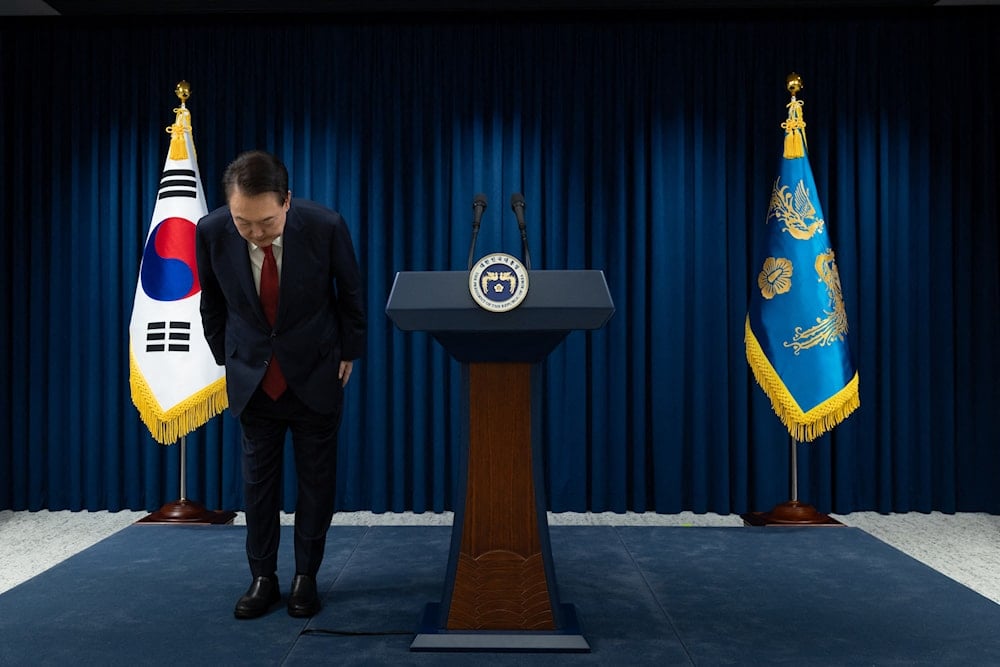South Korean President survives impeachment: Speaker
The filed impeachment motion has failed as it did not meet the required quorum after the President's party boycotted the vote.
-

This handout photo taken and released on December 7, 2024, by the South Korean Presidential Office shows South Korea's President Yoon Suk Yeol bowing after the end of his address at the Presidential Office in Seoul (Photo by Handout/South Korean Presidential Office/AFP)
An opposition-led motion to impeach South Korean President Yoon Suk-yeol over his brief declaration of martial law failed Saturday as it did not meet the required quorum after his party boycotted the vote.
"With a total of 195 votes, the number of members who voted did not reach the required two-thirds majority of the total members. Therefore, I declare that the vote on this matter is not valid," National Assembly speaker Woo Won-shik said.
Yoon shocked the nation and the international community on Tuesday night by suspending civilian rule and deploying troops to parliament. However, he was compelled to backtrack after lawmakers rejected his decree.
Earlier, it was reported that the South Korean President appeared close to averting impeachment, as lawmakers from his ruling party boycotted the parliamentary vote despite massive protests outside the National Assembly.
The impeachment motion, filed by opposition parties holding 192 of the 300 parliamentary seats, required 200 votes to pass and was put to a vote on Saturday evening.
Nearly all 108 lawmakers from Yoon’s People Power Party (PPP) left the chamber before the voting commenced, drawing critical reactions from the opposition. Only three PPP members participated in the vote, while National Assembly Speaker Woo Won-shik refrained from declaring the result, instead urging PPP lawmakers to return "to protect the Republic of Korea and its democracy."
Vast crowds gathered outside parliament, with police estimating the turnout at 150,000, while organizers claimed it exceeded one million.
Protesters jeered, sighed, or even wept as ruling party lawmakers exited the chamber. Some demonstrators left in frustration, while others remained.
In contrast, thousands of pro-Yoon supporters held a rally in Seoul’s main square, demonstrating their continued backing for the president.
Yoon’s apology
Before the vote, Yoon, 63, delivered a public apology for the crisis but left the decision regarding his fate to his party.
"I caused anxiety and inconvenience to the public. I sincerely apologize," Yoon said during a televised address, marking his first public appearance in three days.
He added that he would "entrust the party with measures to stabilize the political situation, including my term in office."
PPP lawmakers largely supported Yoon, even as party leader Han Dong-hoon—allegedly on an arrest list during Tuesday’s events—called for the President's resignation.
If the motion were to pass, Yoon would be suspended from his duties while the Constitutional Court deliberates on the case.
Opposition leader Lee Jae-myung criticized Yoon’s remarks, describing them as “very disappointing” given the widespread anger among South Koreans.
His speech "only exacerbates the sense of betrayal and anger among the citizens," Lee indicated, pointing out that the only viable resolution was "the immediate resignation of the president or an early departure through impeachment."
A poll released on Friday revealed that Yoon's approval rating had sunk to a record low of 13%.
Allegations of insurrection
Meanwhile, police have launched an investigation into Yoon and others for alleged insurrection.
In his declaration of martial law on Tuesday, Yoon stated that it aimed to "eliminate anti-state elements plundering people's freedom and happiness."
Security forces had sealed the National Assembly, deployed helicopters on its roof, and positioned nearly 300 soldiers to lock down the building.
Despite orders to detain key politicians, parliamentary staff reportedly barricaded entrances with sofas and fire extinguishers.
Lawmakers from both parties have claimed that special forces were instructed to “drag out” MPs from the building, though enough members managed to enter—some scaling walls—to nullify Yoon’s decree through a vote.
Read more: South Korea's president faces treason probe, impeachment vote

 4 Min Read
4 Min Read








